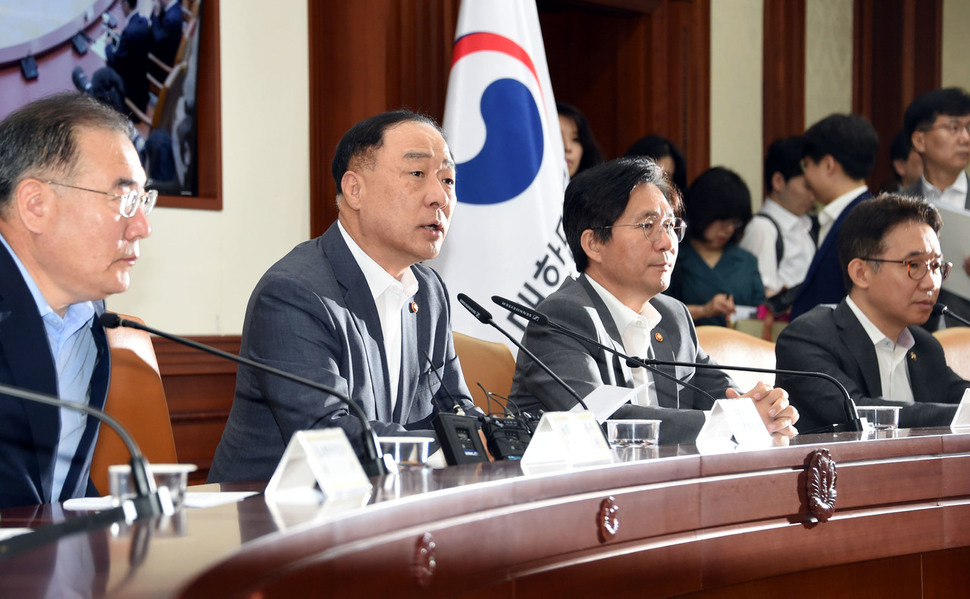 |
|
South Korean Deputy Prime Minister and Minister of Economy and Finance Hong Nam-ki speaks at a meeting of economy-related ministers at the Central Government Complex in Seoul on July 8. (provided by the Ministry of Economy and Finance)
|
Seoul to coordinate with international community against Tokyo’s retaliatory measures
The South Korean government is pursuing a full-scale response to Japan’s controls on exports of key semiconductor and display materials. In addition to convening a meeting of international economy-related ministers to discuss response measures, it also plans to begin coordination with the US and international community. On the morning of July 8, Deputy Prime Minister and Minister of Economy and Finance Hong Nam-ki presided over a meeting of international economy-related ministers at the Central Government Complex in Seoul to discuss issues related to the international economy, including Japan’s export controls. Among the officials attending the meeting that day were Minister of Trade, Industry and Energy Sung Yun-mo and Financial Services Commission Chairman Choi Jong-ku. Minister for Trade Yoo Myung-hee from the Ministry of Trade, Industry and Energy (MOTIE) also attended the meeting to explain the response strategy to Japan’s export controls. Ahead of the meeting that day, Hong noted “concerns that [Japan’s export controls] will result in negative effects not just for South Korean and Japan companies but for the global economy as a whole.” “We will continue to respond in multiple proactive ways through close communication and coordination with the international community, with a focus on minimizing damage to our companies and assisting with their response,” he added. Hong also noted that “several multilateral discussions are scheduled for the second half of the year, including the APEC Summit, the South Korea-ASEAN special summit, and the annual meeting of the International Monetary Fund (IMF).” “This will be a major opportunity to establish international support for global economic growth and preventing the spread of protectionism,” he said. The South Korean government is further weighing plans to dispatch Yoo and others to the US to request mediation or cooperation. Meeting with reporters after the ministers’ meeting that day, Yoo said, “We are considering various plans for international coordination.” She also appealed for “help in keeping quiet, since the other side will realize [the South Korean government’s strategy] if we say what it is we’re doing.” A MOTIE official said it had “not yet been decided who we will be meeting or when.” Another possibility is that the South Korean government’s requests for international coordination could expand to include China – a major importer of South Korean semiconductors – and Southeast Asia. Not only are there a great many countries currently being supplied with South Korean semiconductors and displays, but the argument that Japan’s export control measures are a flagrant violation of the universal international trade principle against prohibitions and restrictions on exports of established items is seen as very likely to win support from the international community. Substantial portion of S. Korea’s semiconductors exported to other Asian countries A substantial portion of South Korea’s US$92.798 billion in semiconductor exports last year went to China (39.5%), Hong Kong (27.2%), Vietnam (9.3%), the US (4.5%), and Taiwan (4.4%). In a July 4 meeting of government institutions connected to the Japanese export controls, Yoo predicted that the measures could “harm our bilateral economic relationship and undermine the global supply system, posing a major threat to the global economy.” The top priority for the South Korean government now is leveraging this kind of pressure to bring Japan to the table for bilateral discussions. On July 2 and 3, Seoul submitted official requests for bilateral discussions with the Japanese Ministry of Economy, Trade and Industry, but Japan has yet to finalize a date for meeting. Meeting with reporters after a field inspection of Korea Midland Power’s Seoul Power Station that day, Minister of Trade, Industry and Energy Sung Yun-mo said that Japan had “sent a response indicating that it agrees in principle to bilateral discussions.” “The content and date of the discussions will be based on a consideration of Japan’s latest measures and what we have demanded,” Sung said. By Lee Kyung-mi and Choi Ha-yan, staff reporter Please direct comments or questions to [english@hani.co.kr]





